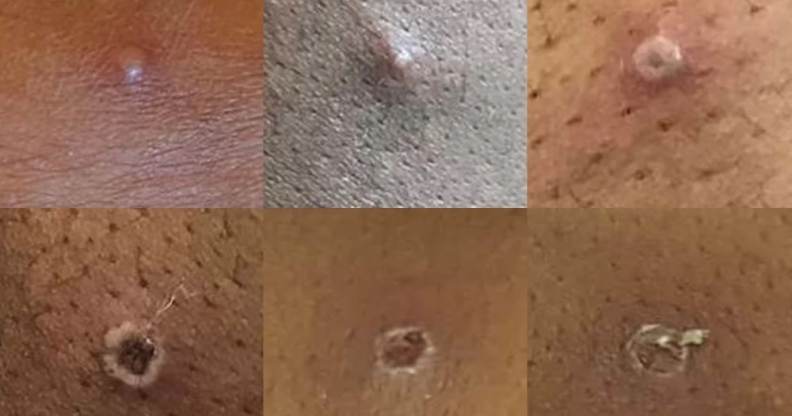Monkeypox: 11 new cases confirmed in UK as queer men urged to stay ‘vigilant’

The stages of monkeypox. (UK Health Security Agency)
British health officials have recorded even more monkeypox cases, bringing the total to 20.
A small number of cases of the rare but potentially serious viral disease has swept the globe. Diagnoses in Europe, Australia, Canada and the US have been recorded in recent weeks.
Health secretary Sajid Javid confirmed the 11 new identified cases on Friday (20 May), adding to the nine previously reported by the UK Health Security Agency (UKHSR).
Many of the nine patients are gay and bisexual men as well as men who have sex with men.
“UKHSA have confirmed 11 new cases of monkeypox in the UK,” Javid tweeted.
UKHSA have confirmed 11 new cases of Monkeypox in the UK.
This morning I updated G7 Health Ministers on what we know so far.
Most cases are mild, and I can confirm we have procured further doses of vaccines that are effective against Monkeypox. pic.twitter.com/T7ECf0E4AW
— Sajid Javid (@sajidjavid) May 20, 2022
“This morning I updated G7 health ministers on what we know so far. Most cases are mild and I can confirm we have procured further doses of vaccines that are effective against monkeypox.”
According to the NHS, monkeypox is spread by wild animals in parts of west or Central Africa. It’s mainly transmitted through very close human contact, such as touching blood or body fluids or prolonged exposure to the respiratory droplets of an infected person.
Symptoms are almost flu-like at first, with fever, body aches and swollen lymph nodes common. They soon develop into a widespread rash on the face, body and palms that turn into pus-filled nodes.
The infection typically lasts between two to four weeks.
Monkeypox – so named because it was first seen in laboratory monkeys – is in the same family as smallpox but is far milder, the UKSHR said.
A number of people diagnosed with monkeypox in the UK are queer men, the agency notes. Health authorities in Portugal and Canada have said the same, prompting medical experts in nations such as Australia to urge queer men to be on the alert for symptoms.
“A large proportion of the cases detected overseas are among gay, bisexual or men who have sex with men,” said New South Wales chief health officer Kerry Chant.
“We are urging men who are gay, bisexual or men who have sex with men to be aware of any unusual rashes or lesions.
“Be particularly vigilant if you have returned from overseas from large parties or sex on premises venues overseas.”

